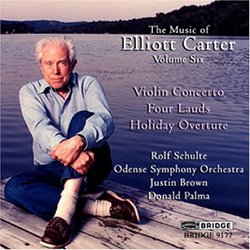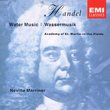| All Artists: Elliott Carter, Donald Palma; Justin Brown, Odense Symphony Orchestra, Rolf Schulte; Michaela Fukacova Title: The Music of Elliott Carter, Vol. 6 Members Wishing: 1 Total Copies: 0 Label: Bridge Records, Inc. Original Release Date: 10/1/2005 Release Date: 10/1/2005 Genre: Classical Styles: Chamber Music, Forms & Genres, Concertos, Theatrical, Incidental & Program Music, Instruments, Strings, Symphonies Number of Discs: 1 SwapaCD Credits: 1 UPC: 090404917721 |
Search - Elliott Carter, Donald Palma; Justin Brown, Odense Symphony Orchestra :: The Music of Elliott Carter, Vol. 6
 | Elliott Carter, Donald Palma; Justin Brown, Odense Symphony Orchestra The Music of Elliott Carter, Vol. 6 Genre: Classical
In celebration of Elliott Carter?s 97th birthday, Bridge Records is proud to be issuing Volume Six of its Elliott Carter Edition. This series of recordings has garnered high critical praise including three Grammy nominati... more » |
Larger Image |
CD DetailsSynopsis
Product Description In celebration of Elliott Carter?s 97th birthday, Bridge Records is proud to be issuing Volume Six of its Elliott Carter Edition. This series of recordings has garnered high critical praise including three Grammy nominations, BBC Music Magazine?s ?Best of the Year?and the ASCAP Deems Taylor Prize. Volume Six features violin virtuoso Rolf Schulte?s highly anticipated recording of Carter?s Violin Concerto, and listeners will surely be thrilled by his electrifying performance. Schulte, in a spectacularly gripping account of Carter?s masterpiece, gives us state-of-the-art violin playing, and British conductor Justin Brown leads the Odense Symphony Orchestra of Denmark in a reading that captures the detailed and panoramic emotional range of this score. Schulte then steps into the spotlight with a superb account of Carter?s collection of violin solos- Four Lauds. Rolf Schulte was the dedicatee of the final movement of this set, ?Fantasy- Remembering Roger? (1999! ), and his performance here takes up where his Violin Concerto reading leaves off. What ultimately makes Schulte?s readings of Carter?s music so exceptionally satisfying is his complete mastery of the technical aspects of this music. Schulte?s playing is so assured and deeply committed that he has the rare ability to transcend the music?s surface difficulties, and reveal its humanistic emotional core. Volume Six concludes with a performance of Carter?s early Holiday Overture, a brassy and celebratory composition that heralded the end of World War II and led to the beginning of Carter?s mature style. Notes by British musicologist Malcolm McDonald, and a number of rare photographs of the composer complete this disc. Similar CDs
|
CD ReviewsElegiac, passionate, and full of virtuosity! Gaetano | 01/07/2009 (5 out of 5 stars) "The sixth volume in Bridge's The Music of Elliott Carter series presents works from two very disparate periods of compositional creativity from the venerated American composer - that from his early neo-classical period utilizing his full training in harmony and counterpoint a la Nadia Boulanger, and his very late works showcasing his mastery of atonal, polyrhythmic arabesques.
The Violin Concerto was written in 1990, and was dedicated to Herbert Blomstedt and the soloist, Ole Bohn (I highly recommend checking out the latter's premiere recording, re-issued on EMI's budget line `American Classics' which includes a superlative performance of the said concerto, the incredible Concerto for Orchestra, and Three Occasions for Orchestra). The Bridge recording features the Odense Symphony Orchestra under the baton of Justin Brown with Rolf Schulte acting out the exciting violin part. From the opening orchestral tutti, Carter's music is an exciting roller coaster ride. The work is in three movements, and Carter's indications - I. impulsivo, II. Tranquillo/Angosciato, III. Scherzando - at least superficially imply adherence to the architecture of the classical concerto format. The notes written by Malcom MacDonald even suggest that the work hints toward the key of D. The musicianship and sound quality, to my ears, is superb. Next up, we have four short pieces for unaccompanied violin conceived as a unified cycle. At least three of the four were written between 1999 and 2000; the sole exception written in 1984. As the title 'Four Lauds for solo violin' suggests, each movement alludes to a specific musical figure - Geoffredo Petrassi, Aaron Copland, Robert Mann, and Roger Sessions. They are superb works filled with melancholy, respect, and fiery passion. The contrast and coherence achieved by virtuosic pizzicatos, triple stops, and sustained elegiac notes will grab your attention and never let go. The music projects clearly. If you are averse to some of Carter's work that can be perceived as overly busy and crowded, I suggest you give this cycle a try. The Holiday Overture written in 1944 (revised 1961) finishes this program. It is a joyous piece in the traditional sense, but one that feels utterly quaint after listening to his later works that precede it. It is interesting how this CD is programmed such that his later works are to be played before his very early works (as opposed to the first CD in `The Music of Elliott Carter' and the Nonesuch CD featuring the Cello Sonata and the Double Concerto). My highest recommendations. " |

 Track Listings (8) - Disc #1
Track Listings (8) - Disc #1

